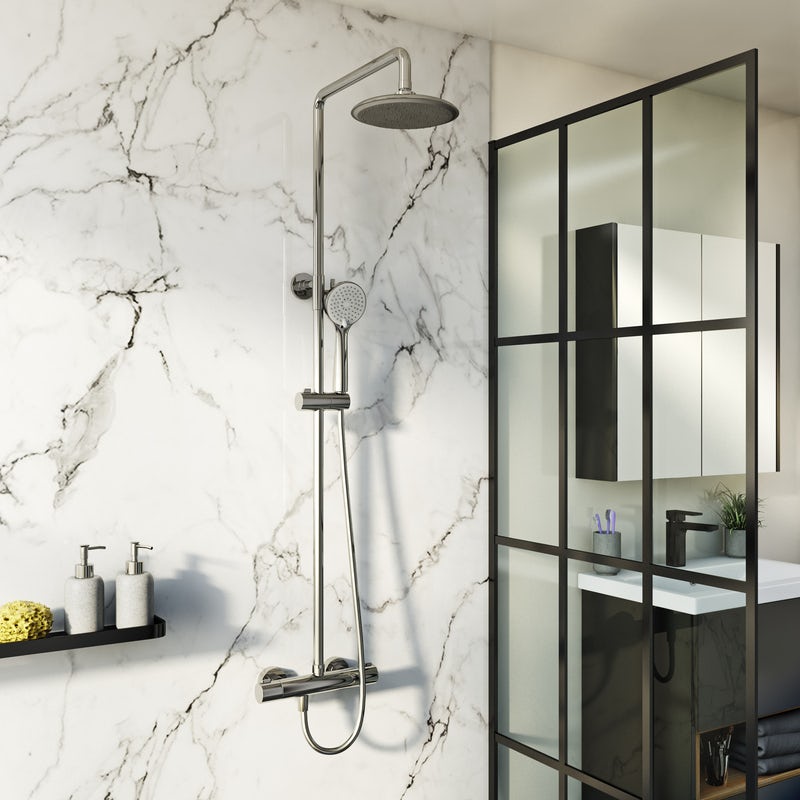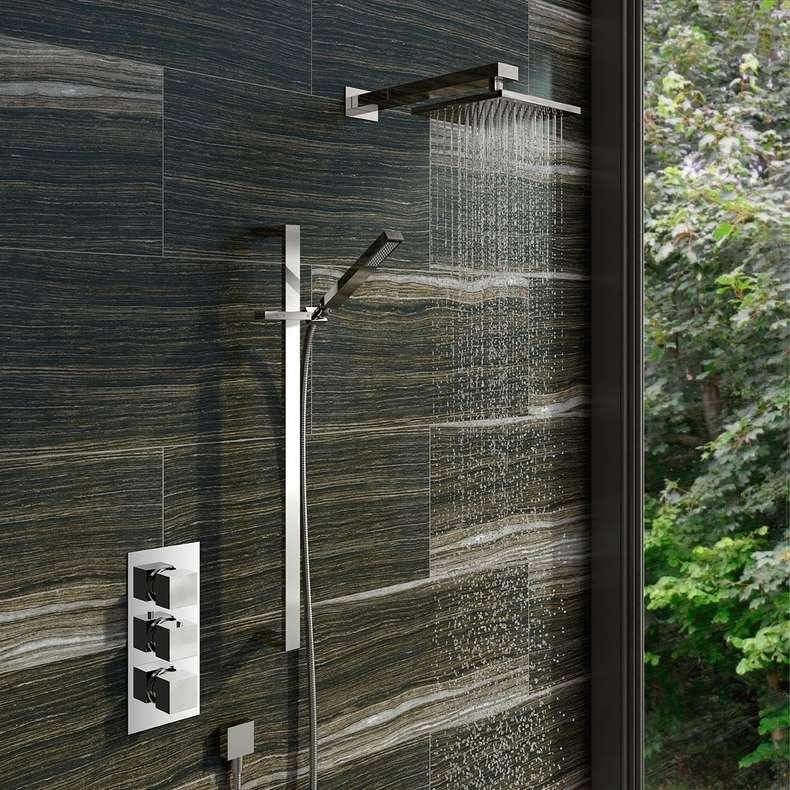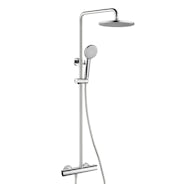In this expert guide, we’ll explain everything you need to know about water pressure in simple terms, including how to test your water flow rate, how to improve it, as well as answering some of your most frequently asked questions.
Low water pressure is a common complaint up and down the country. If your home suffers from this, then the effects are obvious. Instead of a rapid flow through your taps and shower, you are more likely to be faced with a slow dribble of water—most certainly resulting in a thoroughly unsatisfying shower experience.
Click on any of the links below to jump to the most relevant section.
- What is water pressure?
- What is the difference between water pressure and water flow?
- How to test your water flow rate
- How to improve water pressure
- Water pressure FAQs
- Showers for low pressure water systems
- Further help and advice
- Shop showers
What is water pressure?
Put simply, water pressure is the measure of force to get water through the mains and into your pipework.
Water pressure is measured in “bars”—one bar being the equivalent to the force required to push water up to the height of 10 metres.
As you are probably already well aware, water pressure can vary greatly from home to home, room to room and even at different times of the day.
Generally, mains water pressure depends on where your home lies in relation to the nearest reservoir or supply. If you live atop a hill, your water pressure is likely to be weaker than someone whose home is situated at the bottom of a valley, simply due to how quick the flow will be to that destination. Uphill = Flow is weaker as it works against gravity. Downhill = Flow is stronger as gravity aids it.
To get an idea of how this affects your mains water pressure, check with your local water authority. Find out where the nearest reservoir is and plot a course between that and your home. Is your home higher or lower than the reservoir?
Of course, no matter how good or bad your initial water pressure is, demand for water will also affect it. Between 7 and 9 in the morning, you may experience lower water pressure as other people in your area also use water for baths and showers. Warm summer evenings may also mean a lack of water pressure as people water their gardens.
If your mains water pressure is poor, this thermostatic mixer shower from Orchard Bathrooms is designed to work well with a minimum water pressure of just 0.2 bar
What is the difference between water pressure and water flow?
When attempting to understand water pressure, it’s important to point out that there is a difference between “water pressure” and “water flow”. Let’s try and put this into simple terms.
If water pressure is a measure of force, water flow is a measure of volume, i.e. how much water is flowing through your pipes or an outlet (like a tap or shower) at any one time and is measured in litres per minute.
Whilst these are 2 different things, water flow rate from a bathroom tap or shower can often give a good indication of your overall water pressure.
How can I test my water flow rate?
There is a simple way to accurately measure your water flow rate (which can give you an indication of your water pressure). Watch this short video to find out how.
Here is how to measure your water flow rate
- Get a water jug (preferably 1 or 2 litres in size)
- Get a stopwatch (usually found on most mobile phones)
- Place your jug under your bathroom tap or shower and turn it on
- Time 6 seconds on your stopwatch & turn your tap or shower off.
- If you're a whizz at maths, you can do the next bit in your head (or simply use a calculator—found on most mobile phones). Take the amount of water in the jug in litres (e.g. 0.8 litres) and multiply this by 10. This will give you your flow rate in litres per minute (e.g. 0.8 litres x 10 = 8 litres per minute).
- If your flow rate is less than 10 litres per minute, you may have what is considered low water pressure. Anywhere between 10 and 15 litres per minute is acceptable but can be improved. A flow above 15 litres per minute is considered good.
If you have a combination shower, like the Mode Ellis complete shower set, a shower pump is highly recommended for gravity fed water systems
What can I do to improve my water pressure?
Water pressure isn't really much of an issue when it comes to washing your hands, brushing your teeth or washing your dishes, but it will significantly affect the performance of your shower and how quickly you can fill your bath.
The first thing you need to do is identify which home water system you have. To find this out, head over to our blog post "Do I need a shower pump?" where we've provided a handy infographic which will help.
If you have a combi boiler system the following may help:
- Ensure your stop tap is fully open
- Ensure any systems are set to the statutory minimum level of 1 bar
If you have a gravity fed system (the most common in the UK), you can always add a shower pump. These can be purchased from around £180 and will improve the performance of your showers and taps, no matter how good your mains water pressure currently is.
For further information, check out our shower pump buying guide.
Water pressure FAQs
Below, you’ll find some of the most frequently asked questions about water pressure along with our own expert answers.
What is "good" water pressure?
If your home water outlets (i.e. taps and showers) can deliver over 15 litres of water per minute, this is considered good water pressure. Between 10 and 15 litres of water per minute is acceptable. Anything below this is considered poor.
What is normal mains water pressure?
Your water supplier must be able to supply a statutory 1 bar of normal mains water pressure (enough pressure to move water vertically to a height of 10 metres). This should be measured at the point that pipework enters your property, for example at the boundary of your property.
Why is my water pressure so bad (and how can I make changes to improve it)?
Your water pressure could be bad due to a combination of factors, including the type of water system you have, where your property is located in relation to your nearest reservoir and the time of day you tend to use your outlets.
How do I fix low water pressure in my house?
Whilst you can’t move your property to another location, you can make improvements, depending on the type of water system you have. If you have a gravity fed system (the most common in the UK), you could fit a shower pump. If you have a combi boiler system, make sure your stop tap is fully open and all systems are set to the statutory 1 bar minimum level. Find out more about home water systems.
What is the water pressure in my area?
As we’ve already mentioned, the water pressure in your local area can vary due to a whole host of reasons. If you’re looking to move to a new property, it is always worth discussing water pressure with the previous owner, landlord or estate/letting agent. You can also seek advice from your local water company, who should be able to tell you whether certain products, like showers, are compatible with the water pressure in your local area.
Showers for low pressure water systems
If you suffer from low water pressure, you'll be pleased to hear we stock a range of showers suitable for your situation. Find out more about our low pressure showers now.
Further help and advice
At Victoria Plum, you can find loads of expert advice on water pressure, showers and more. Simply click on any of the links below to find out more.
- Do I need a shower pump?
- Shower pump buying guide
- Shower buying guide
- Power showers: What you need to know
- How to save water in your home
- What is a thermostatic shower valve and how does it work?
- Understanding home water systems
Shop showers
For a huge range of showers to suit all water systems and budgets, click on the image below to begin browsing.











